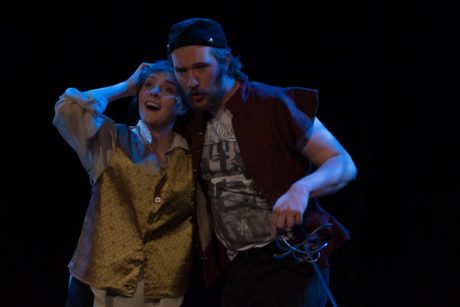Queering Shakespeare may be gilding the lily. And if so DC these days has seen quite a few such embellished flowers. Like, golden nosegays for days. One of the best and freshest in the bunch is Theatre Prometheus’ [gay] Cymbeline. It’s a two-hour gender adventure that’s as fun, funny, and touching as a romp in the sack.

The story line of Cymbeline is notoriously convoluted. It’s said Shakespeare deliberately made it so as a prank. And one can imagine groundlings going, So many plot twists! This is whack! And then it dawns on them, Oh duh, this piling on of plots is a running gag. LMAO.
Cymbeline is at heart a comedy and as such it’s got one of Shakespeare’s simplest-to-follow and most surefire emotional hooks: Two people madly in love and lust who get separated by treacherous, intractable circumstances but then get reunited in each other’s arms by the end. Tearfully and joyfully. Like, everyone on stage and everyone in the audience just loses it they’re so happy.
The way Theatre Prometheus pulls that off with Cymbeline is a delight. The torn-asunder lovers are Imogen and Posthumus, who were written as female and male but are here played as lesbian. Surprisingly, this cross-gender casting makes the whole play make more persuasive modern sense.
Imogen’s mother the Queen wanted her to marry Clotus, her dufus son by a previous marriage, because she has dynasty designs on the match. Instead Imogen married Posthumus, whom her father the king, Cymbeline, banishes from the court because he’s lowborn and beneath her. But Imogen is passionately in love with Posthumus and will not be deterred. The gender switch that Theatre Prometheus makes to queer the play is to make Posthumus an amorous stone butch and Imogen a feisty femme. This immediately turns the explicit elitism of the parental no-no into implicit no-homo. And it works brilliantly.
There’s another juncture in the story that illustrates what can be searing about this queering. The banished Posthumus, now an ex-pat in Rome, meets Iachimo, a sketchy fellow with a low opinion of women’s morals. His own being even lower, he makes a bet with Posthumus that he can bed Imogen. There’s a subsequent scene where Iachimo does indeed attempt to seduce Imogen (he doesn’t succeed, but he later pretends to have). And what we see in Theatre Promethesus’ rendering is the added innuendo of the straight dude’s fantasy that all a dyke needs is a good dick.

That all of this layering comes off hilariously is due to direction, acting, performance style, and stage arts that are utterly beguiling.
Director and Producer Tracey Erbacher, who conceived this approach to the text along with Dramaturge (and Imogen) Caitlin Partidge, sets a pace from the top that just keeps delivering knockout moments—from lip locks to sword fights to silly walks to comic chases. The audience I saw the show with kept cracking up.
Standouts in the superlative cast included Caitlin Partidge playing Imogen as a take-no-BS ingenue, Zach Boylan playing Cloten as a clueless goofball, Briana Manente playing Posthumus as all love-lorn in leather, and Jonathan Rizzardi playing Iachomo as a half-cocked cock of the walk.
Also: Rachael Murray as a giddily addled Cornelia, the doctor who provides a pivotal potion, and Jacqueline Chenault as the faithful servant Pisanio, who first sets the scene for us and whose earnest grace continues throughout the play to connect us to the goings-on.
Additionally but not least: Renea Brown (Second Lord / Buiderius), Renae Erichsen-Teal (Queen / Belarius), Mollie Goff (First Lord / Frenchman / Arviragus), Christopher Holbert (Cymbeline / Philario), Rachael Murray (Helen), Jonathan Rizzardi (Caius Lucius), and Zach Boylan (two Captains).
There’s a particular style of crisp and wittily inflected diction along with antic physical comedy in this production that’s remarkably consistent from actor to actor, and it accounts for much of the pleasure. It’s a style I can’t put my finger on to describe, though. I think it may have to be seen and heard. Suffice to say, it had me enthralled throughout.
Lighting and Scenic Designers Eric McMorris and Yannick Godts frame the action in a proscenium, pretty in pink, green, and ivory, and create with light a wonderful flow of worlds within. Costume Designer Kristina Martin kept amusing me with her mishmash of contemporary and faux-classic. Between scenes Sound Designer Patrick A. Lachance placed snippets of pop songs whose lyrics were like amazing annotations to the action. And Fight Choreographer Megan Beham made the zaniest mayhem a side show in itself.
The run of [gay] Cymbeline isn’t long. So pick this gilded lily quickly while it’s still in bloom.
Running Time: About two hours, including one intermission.
[gay] Cymbeline plays through January 29, 2017, at Theatre Prometheus performing at the Anacostia Arts Center’s Black Box Theatre – 1231 Good Hope Road, S.E., in Washington, DC. Tickets are available online.





